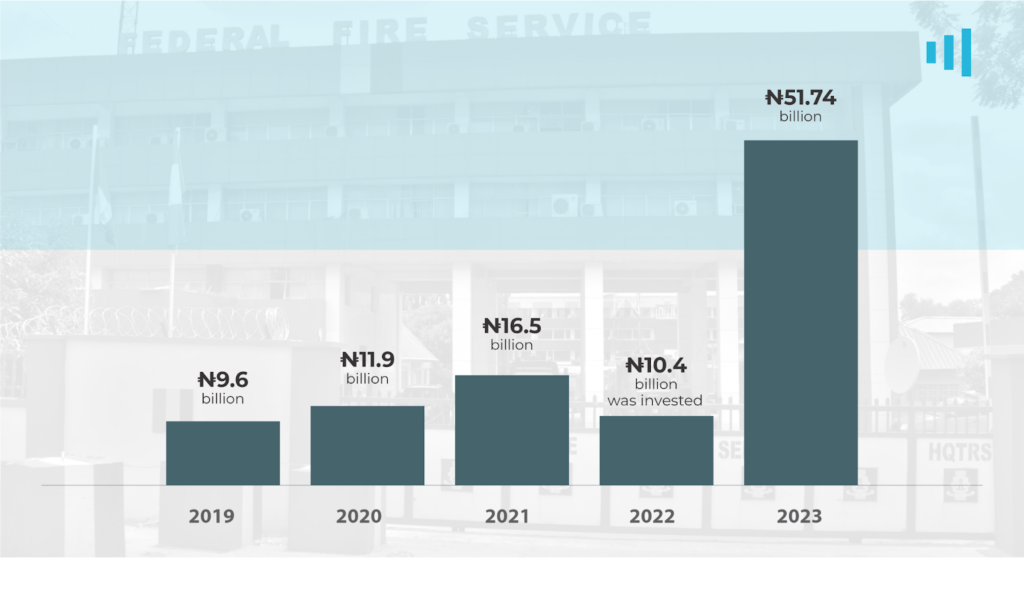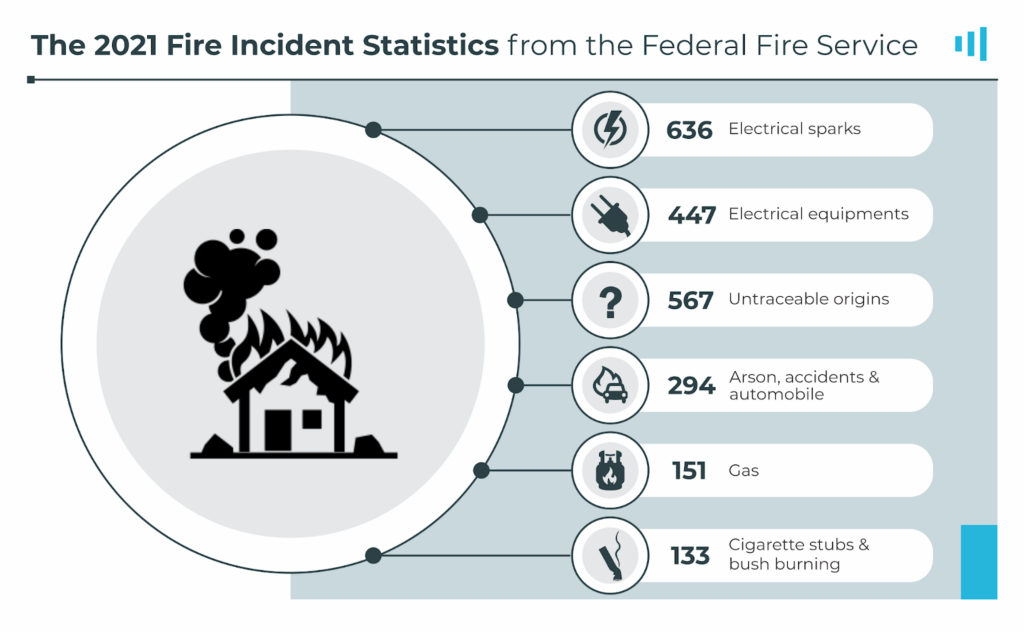How Effective Is Nigeria’s Fire Service Despite Huge Allocations?
In 2023, Nigeria’s Federal Government allocated a total of 51.74 billion naira to the Federal Fire Service. Recent fire outbreaks in the country are prompting the question: To what extent are Nigerians getting value for their money?

On June 7, 2022, the building where Bolanle Ajayi lived in Lagos, South West Nigeria, got engulfed in flames. It comprised not only her home but her shop and four other residences.
Apparently, a resident had opted for the electric stove to conserve gas while preparing a meal for her family. There was a power outage, and she was forced to fall back to the gas stove. But, when she returned from an errand moments after, the house was on fire. It turned out that she had forgotten to turn off the electric stove when the power went off. So when it was restored, due to the current of the power supply at that moment, there was a spark that triggered the fire outburst.
“When the fire service arrived at the venue, the people in the neighbourhood trying to put out the fire wanted to cause a scene with the firefighters for getting to the incident late,” Ajayi told HumAngle. The fire service, on the other hand, blamed this on traffic and the fact that they were coming from a far distance. The fire lasted for about four to five hours before it was tamed.
“But it took until the next day for the fire to finally go off,” she said.
Ajayi’s case is not an isolated one. There have been other such incidents. For example, on Dec. 23, 2023, a spark from a small pastry shop at Council Market located in Idimu local government area of Lagos State led to a fire that consumed five others, including a mechanic workshop that housed customers’ cars worth N50 million.
“A pastry shop owner in that market didn’t realise that her gas was leaking until it exploded. She didn’t know what to do, so she kept pouring water on it till the fire became bigger and bigger,” Saheed Akinkunmi, an eyewitness, told HumAngle.
Another devastating occurrence was on Jan. 9, at the Lagere axis of Ile-Ife in Osun State, also in the country’s southwest. When the fire consumed a popular petrol filling station in the area, it affected the hostels of some students of the Obafemi Awolowo University and properties in the vicinity. Apart from the loss of valuable property, the incident left the students without accommodation.
More recently, on Jan. 16, a plaza in Agbor along the old Asaba road in Delta State, South-South region was set ablaze by a leaking gas cylinder that was used to power a generator.
“Although the firefighters came about 30 minutes after they were called, they didn’t have enough water to put it off, so they left to get more water,” Marvellous, an eyewitness, said.
The numbers
In 2024 so far, several fire incidents have been recorded, including the Panteka market fire in Rigasa, Kaduna, on Jan. 17 which destroyed the timber section of the market as confirmed by the National Emergency Management Agency (NEMA). Other incidents involved a building fire at Tudun Wada Quarters in Kano, causing seven casualties from smoke inhalation, another at Horo Eastern by-pass depot resulting in one fatality.
There have also been fires in the Bodija area of Ibadan on Jan. 16, the IC World Emporia blaze in Gwarimpa, in the Federal Capital Territory on Jan. 17, and the Sobi Hospital outbreak in Ilorin, Kwara State, on Jan. 2.
In 2023, the Lagos State Fire Service recorded 1,642 fire incidents between January and June, with 42 persons killed. The Kaduna State Fire Service also recorded 325 fire outbreaks, with 17 persons rescued, 26 injured and 12 deaths.
Maj. Gen. Taoreed Lagbaja of the Nigerian Army noted that the number of incidents recorded in Nigeria in 2022 totaled 2,056, with a loss of properties worth one trillion naira.
In 2021, the Federal Fire Service responded to 2,845 distress calls, with no fewer than 136 lives lost, and 3 trillion naira worth of properties consumed.
The Kano State Fire Service revealed that 100 persons lost their lives in fire incidents in the state from January to December 2023, and ₦451 million worth of properties were destroyed by fire across the state within this period.

The Fire Service Act states that the Fire Service shall be employed for the “extinguishment, control, and prevention of fire, the saving and protection of life and property, and for such other humanitarian and other works as may be required of them under the authority of the minister.” On the website of the Federal Fire Service, it is stated in agreement to this Act that they perform this duty around the clock, 24 hours/7 days a week.
With over 119 years of service and the relentless news of fire incidents lately, it is unclear if these standards are upheld.
In 2019, the Federal Fire Service received ₦9.6 billion for its operations. The allocation increased to ₦11.9 billion in 2020 and further rose to ₦16.5 billion in 2021. By 2022, it was disclosed that over 10.4 billion was invested. Notably, in 2023, a substantial boost saw the Federal Government allocating a total of ₦51.74 billion (about $58m) to the Federal Fire Service.

Quality of service
A common factor in these recounted fire incidents is that the fire service consistently arrived late and exacerbated the situation at hand.
“It took over an hour for them to arrive at the scene. This is because the nearest fire station close to us was burned down during the END SARS rampage in 2020. So they had to come from a further location which delayed them,” Akinkunmi said.
In Ikotun, Lagos State during the heat of the protest in 2020, a fire station, along with a police station got burned down and several other shops were looted. Three years later, a new police station was constructed and the looted stores and shops restocked. But the fire station remains in ruins despite the budgetary allocations in succeeding years. If it had been restored, would the fire incidents in Council Market and Bolanle Ajayi’s compound have escalated?”
In 2023, the acting director of the Kogi State Fire Service, Salawu Umar Ozigi, said that they lacked serviceable vehicles, working tools, and inadequate personnel.
“The two firefighting vehicles under our care have all broken down. Currently, there is no vehicle to respond to distress calls. One of the vehicles is parked at the Nataco end of the city, and the second is at the headquarters of the organisation at the Ministry of Works in Lokoja.”
Lukman Abubakar, a resident of Azare in Katagum Local Government Area of Bauchi State pointed out that, “In the whole Azare, there is only one firefighting truck serving the community and neighbouring local government areas. When a fire outbreak rocked Azare market some months back, the entire place was razed down because there were no fighting trucks and equipment to put off the fire.”
Fire education
The 2021 Fire Incident Statistics from the Federal Fire Service exposed electrical sparks as the primary cause of fire outbreaks, accounting for 636 incidents. Electrical equipment followed closely with 447 cases, while 567 cases had untraceable origins. Arson, accidents, and automobile fires combined for 294 cases, while gas and special services contributed to 151 incidents. Additionally, 133 fires were attributed to cigarette stubs and bush burning.

Examining the role of fire prevention, the duty falls on the Federal Fire Service to educate the public on avoiding and managing fire incidents. HumAngle conducted an analysis of the Federal Fire Service’s social media pages to gauge the frequency of public awareness initiatives on this crucial matter.
The Federal Fire Service last used their Instagram platform for public awareness campaigns in 2021. In the following years, it has only been used as a platform for press releases.
Analysis of their Instagram engagement reveals minimal interaction, with posts garnering no more than 200 likes and 5-8 comments. In contrast, their X (formerly Twitter) page, with 71,000 followers, has more frequent public sensitization, and exhibits notably higher engagement levels.
Support Our Journalism
There are millions of ordinary people affected by conflict in Africa whose stories are missing in the mainstream media. HumAngle is determined to tell those challenging and under-reported stories, hoping that the people impacted by these conflicts will find the safety and security they deserve.
To ensure that we continue to provide public service coverage, we have a small favour to ask you. We want you to be part of our journalistic endeavour by contributing a token to us.
Your donation will further promote a robust, free, and independent media.
Donate HereStay Closer To The Stories That Matter




